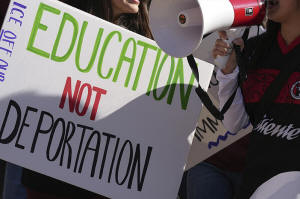The US government has a new policy for terminating international
students' legal status
[April 30, 2025]
By MORIAH BALINGIT
WASHINGTON (AP) — The U.S. government has begun shedding new light on a
crackdown on international students, spelling out how it targeted
thousands of people and laying out the grounds for terminating their
legal status.
The new details emerged in lawsuits filed by some of the students who
suddenly had their status canceled in recent weeks with little
explanation.
In the past month, foreign students around the U.S. have been rattled to
learn their records had been removed from a student database maintained
by Immigration and Customs Enforcement. Some went into hiding for fear
of deportation or abandoned their studies to return home.
On Friday, after mounting court challenges, federal officials said the
government was restoring international students' legal status while it
developed a framework to guide future terminations. In a court filing
Monday, it shared the new policy: a document issued over the weekend
with guidance on a range of reasons students' status can be canceled,
including the revocation of the visas they used to enter the U.S.
Brad Banias, an immigration attorney representing a student whose status
was terminated, said the new guidelines vastly expand ICE's authority
beyond previous policy, which did not count visa revocation as grounds
for losing legal status. In the past, if a student had their visa
revoked, they could stay in the U.S. to finish their studies — they
simply would not be able to reenter if they left the country.
“This just gave them carte blanche to have the State Department revoke a
visa and then deport those students even if they’ve done nothing wrong,”
Banias said.
Many of the students who had visas revoked or lost their legal status
said they had only minor infractions on their record, including traffic
violations. Some did not know why they were targeted at all.

Lawyers for the government provided some explanation at a hearing
Tuesday in the case of Banias' client Akshar Patel, an international
student studying information systems in Texas. Patel's status was
terminated — and then reinstated — this month, and he is seeking a
preliminary court ruling to keep him from being deported.
In court filings and in the hearing, Department of Homeland Security
officials said they ran the names of student visa holders through the
National Crime Information Center, an FBI-run database that contains
reams of information related to crimes. It includes the names of
suspects, missing persons and people who have been arrested, even if
they have never been charged with a crime or had charges dropped.
[to top of second column]
|

Students march at Arizona State University in protest of ASU's
chapter of College Republicans United-led event encouraging students
to report "their criminal classmates to ICE for deportations", Jan.
31, 2025, in Tempe, Ariz. (AP Photo/Ross D. Franklin, File)

In total, about 6,400 students were identified in the database
search, U.S. District Judge Ana Reyes said in the hearing Tuesday.
One of the students was Patel, who had been pulled over and charged
with reckless driving in 2018. The charge was ultimately dropped —
information that is also in NCIC.
Patel appears in a spreadsheet with 734 students whose names had
come up in NCIC. That spreadsheet was forwarded to a Homeland
Security official, who, within 24 hours of receiving it, replied:
“Please terminate all in SEVIS.” That's a different database listing
foreigners who have legal status as students in the U.S.
Reyes said the short time frame suggested that no one had reviewed
the records individually to find out why the students' names came up
in NCIC.
“All of this could have been avoided if someone had taken a beat,”
said Reyes, who was appointed by President Joe Biden. She said the
government had demonstrated “an utter lack of concern for
individuals who have come into this country.”
When colleges discovered the students no longer had legal status, it
prompted chaos and confusion. In the past, college officials say,
legal statuses typically were updated after colleges told the
government the students were no longer studying at the school.
In some cases this spring, colleges told students to stop working or
taking classes immediately and warned them they could be deported.
Still, government attorneys said the change in the database did not
mean the students actually lost legal status, even though some of
the students were labeled “failure to maintain status.” Instead,
lawyers said, it was intended to be an “investigative red flag.”
“Mr. Patel is lawfully present in the U.S.,” Andre Watson of the
Department of Homeland Security said. “He is not subject to
immediate detention or removal.”
Reyes declined to issue a preliminary injunction and urged lawyers
from both sides to come to a settlement to ensure Patel could stay
in the U.S.
All contents © copyright 2025 Associated Press. All rights reserved |